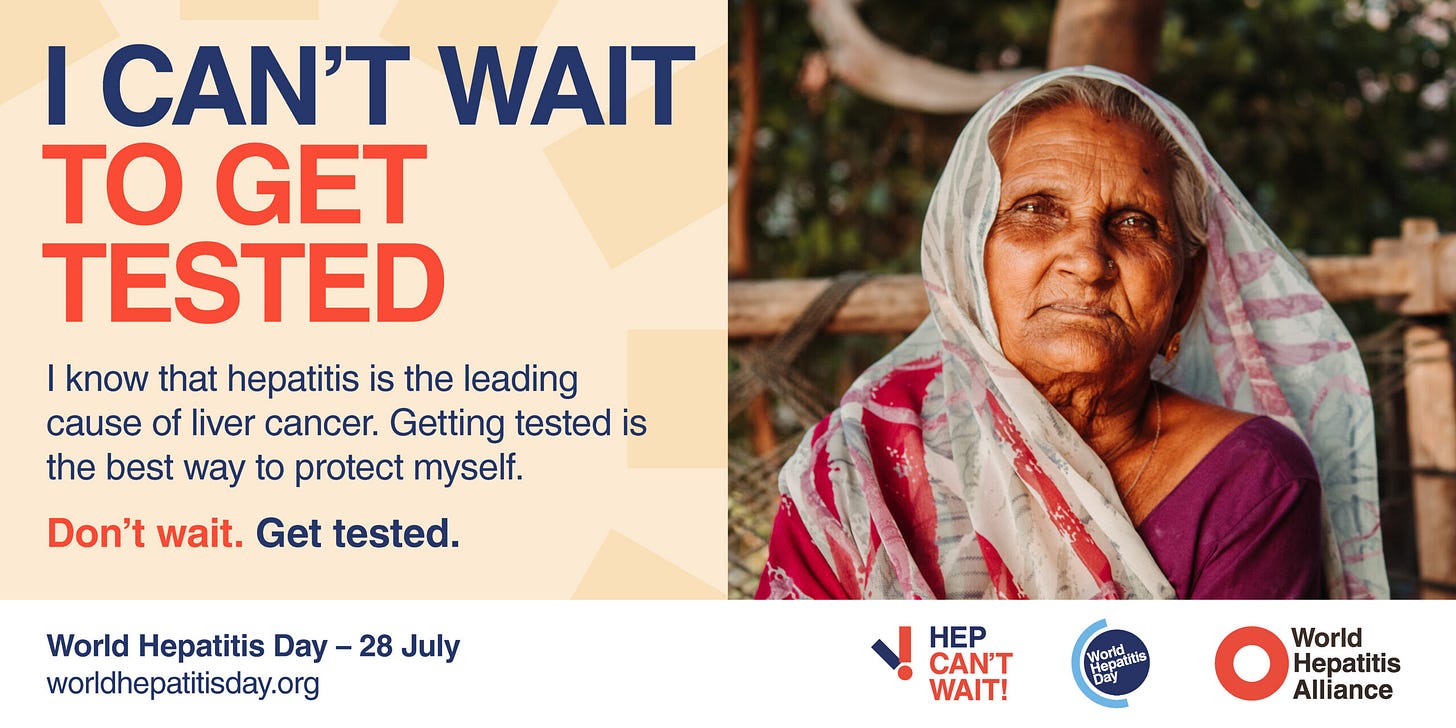What is Hepatitis?
Welcome to another Lefteris Asks science newsletter! Every Wednesday I share news that I find interesting from the world of science and academia. I do my best to write small explanations about them and start a discussion. If you found this newsletter online and want to get them right in your inbox you can subscribe using the cute button below! It’s free!
This is week 4 of the special newsletter during my vacation and since tomorrow July 28th is World Hepatitis Day, I thought it would be a great time to talk a little bit about hepatitis. What is it? why are there so many types? and what can you do to help people with hepatitis?

What is hepatitis?
It is one of those times that knowledge of the Greek language comes to my benefit. I assure you it only happens with medical terms and phobias. Hepatitis comes from the ancient Greek word υπαρ which means liver. Ok, this doesn’t 100% explain what hepatitis means but at least you know where you should be looking at. Hepatitis is the inflammation of the liver.
When your body interacts with something irritating, harmful, or a pathogen then it tends to want to protect itself by bringing more blood cells, immune cells, or anything else that the body needs in order to eliminate that initial stimulus. When your liver is damaged by a virus or alcohol or anything else that damages it then it gets inflamed and you can develop hepatitis. Hepatitis can be sudden and severe (acute) or long-term (chronic) and there are different types of viruses that cause different types of hepatitis.
Let’s talk letters

There are different types of viruses of hepatites namely, A, B, C, D, and E. While they all affect the liver and have similar symptoms they differ in the way of transmission and the way they affect our body.
Hepatitis A: The most often method of transmission of this type of hepatitis is through the consumption of food and drink that has been contaminated with feces. People that get infected with hepatitis A usually have severe symptoms that are short-lived and they make a full recovery
Hepatitis B: Hepatitis B is transmitted through infected blood or fluids contact. Also, it can get transmitted through unprotected sex with a partner that has Hepatitis B. You cannot get infected through kissing, hugging, or sharing food. There is a safe treatment and a vaccine you can get in order to be protected from the virus. Additionally, pregnant ladies that have hepatitis B can get treatment to reduce the risk of transmitting the virus to their babies, and after being born the babies can get a vaccine. Short-term symptoms include fever, nausea, dark urine, joint pain, and more.
Hepatitis C: Hepatitis C is similarly transmitted through infected blood contact. The most common way of transmission is through syringes or tattooing with unsterile equipment. For most people, hepatitis C is a short-term illness but if it lingers for more than 6 months it can cause liver disease and cancer.
Hepatitis D: Hepatitis D only infects people that have been infected with hepatitis B. It gets similarly transmitted through infected blood contact. While there is no vaccine to protect from hepatitis D, however prevention measurements for hepatitis B similarly work for preventing hepatitis D.
Hepatitis E: Hepatitis E is transmitted in the same way as hepatitis A through the consumption of food or drinks that have been contaminated with feces. The symptoms range from fatigue, loss of appetite, and jaundice. Many people that have hepatitis E have no symptoms, however.
There are also other types of hepatitis caused by excess alcohol consumption or as an autoimmune disease.
How can you help?
This year the theme for World Hepatitis Days is can’t wait. There is a person dying of a hepatitis-related illness every 30 seconds. People that suffer from hepatitis need to have access to medicine and testing. At the same time, the stigma associated with hepatitis needs to end. The official website of World Hepatitis day has a bunch of information and different methods that you could get involved with.
Any more news?
People in academia are constantly coming up with new and exciting things so if you need more to quench your curiosity here are some more headlines.
Highly Transparent Solar Cell with 2D Atomic Sheet Successfully Fabricated, by Tohoku University
Laughter with friends differs from laughter with romantic partners, study finds, by PsyPost
MIT scientists found a drastically more efficient way to boil water, by BGR
That’s all for this week! I hope that the rest of the week will be calm and rewarding. Did you like this newsletter? If you did you can subscribe to it at the top of the page and why not share it around using this sexy little button here
If you have any questions, suggestions, or something you want to talk about why not write a comment right below here! That’s the easiest way for us to communicate!
Until next week… take care and be kind [=



